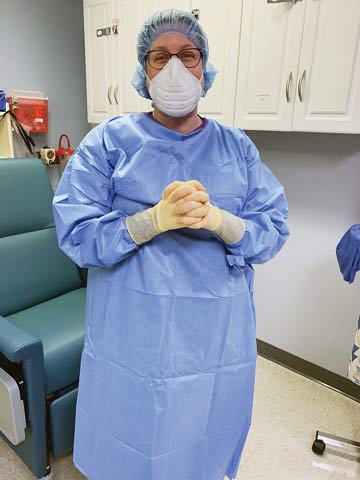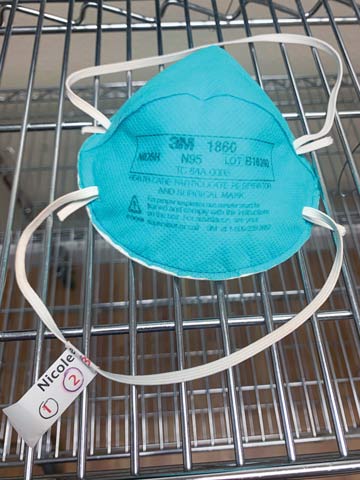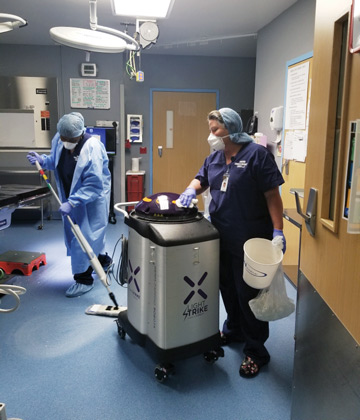Karen Curley, RN, nursing director of procedural services at UConn Health Surgery Center in Farmington, Conn., is helping to reopen the facility, which stopped hosting elective procedures on March 17. Nearly a month later, the center began to
gradually add elective cases.
“The decision to start slowly was made in the interest of staff and patient safety, the availability of COVID-19 testing and adequate levels of PPE supplies,” says Ms. Curley. “We wanted to make sure we had all the necessary
resources in place.”
- Prioritizing screening. All patients scheduled for surgery at LSDC must obtain negative COVID-19 test results within five days of their scheduled procedures. Most of the center’s patients originate from a large clinic
in town, so Ms. Williams asked referring physicians to coordinate the testing for the patients they refer for surgery.
You know what they say about best laid plans.
“Testing has been hit or miss,” says Ms. Williams. “We’ve waited up to nine days for results. We thought securing testing in time would be an easy process, and did not anticipate the delays we’re seeing.”
She thinks the clinic was unprepared for the overwhelming demand for screening when the state began to reopen and the strain that put on the local lab responsible for processing the tests. In hindsight, Ms. Williams believes she could have communicated
more clearly with the clinic about their testing process.
LSDC now sends patients who don’t have tests completed within 24 hours of their procedures to the local hospital, which can provide results within five hours. “We’re paying for the rapid turnaround, but we’re keeping cases
on the schedule and the patients are getting their surgeries done,” says Ms. Williams.
The facility’s online registration portal now includes questions about possible COVID-19 exposure and symptoms, which staff review during the pre-screening process. On the day of surgery, patients are screened at a makeshift station set
outside the center’s main doors. They’re asked to sign a COVID-19 form, on which they acknowledge the procedure they are about to undergo is elective and they are incurring some risk by entering the facility.
On the form, a staff member notes patients’ responses to questions about their possible exposure to COVID-19 and symptoms of the virus they might be experiencing, including cough, shortness of breath and fatigue.
The staff member conducting the screenings takes patients’ temperature readings and oxygen saturation levels, and notes them on the form. A case is immediately canceled if a patient has a temperature of 99.5 degrees or higher or an oxygen
saturation level of 94% or less, which is an indicator of COVID-19 pneumonia. In some cases, patients can schedule an urgent chest X-ray, which, if clear, would allow the procedure to proceed
.
LSDC’s staff members and surgeons have their temperatures taken and answer questions about possible exposure to COVID-19 before entering the facility each day.
Dr. Marx says Upstate Hospital’s patients must be tested within 24 and 72 hours of their surgeries, a tighter window that works due to the health system’s resources. However, testing has been difficult to complete for the large numbers
of patients who travel several hours for access to surgical care unavailable in their rural communities. “We’re trying to coordinate timely testing with local primary care physicians, but it’s been challenging,” says
Dr. Marx.
- Ramping up gradually. Ms. Williams says LSDC decided to build up its case volume slowly to ensure the facility could maintain social distancing requirements and appropriately clean patient care areas between cases. The center’s
ORs operated at 50% capacity for two weeks after reopening. The facility’s leaders then reevaluated the center’s new protocols to determine if case volume could be ramped up to 75% capacity in weeks three and four.
The results are mixed, according to Ms. Williams. She says the facility’s four ORs have reached the capacity goal, but case volumes in the five GI procedure rooms remain stagnant due to a perfect storm of misfortune: furloughed staff in
the clinic that refers patients to the center, delays in securing COVID-19 test results and the retirement of a top-producing physician.
.svg?sfvrsn=be606e78_3)



.svg?sfvrsn=56b2f850_5)